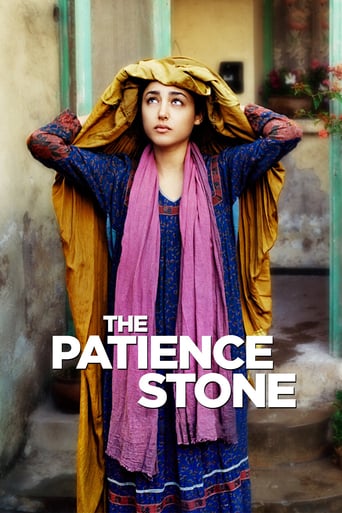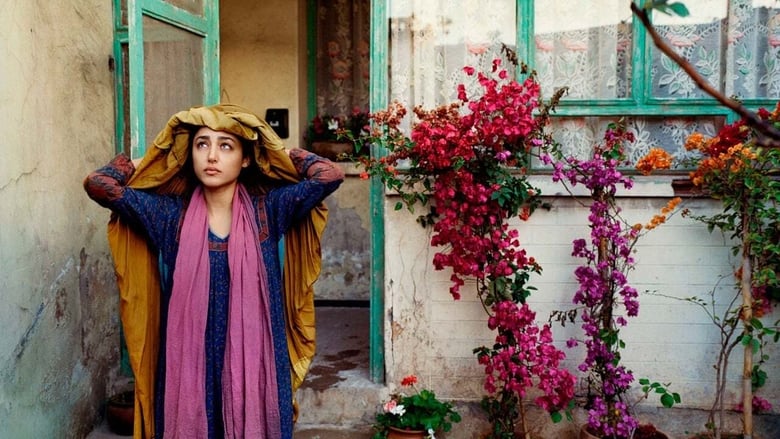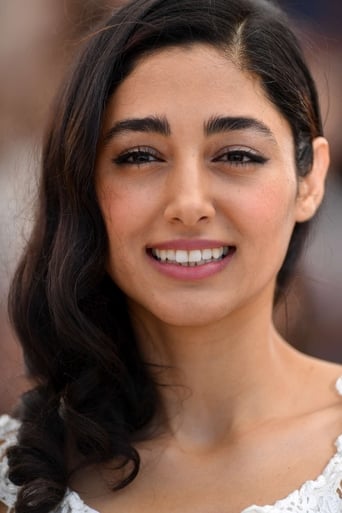

The Patience Stone (2013)
In a war ridden country a woman watches over the husband reduced to a vegetable state by a bullet in the neck, abandoned by Jihad companions and brothers. One day, the woman decides to say things to him she could never have done before.
Watch Trailer
Cast
Reviews
In truth, there is barely enough story here to make a film.
There's no way I can possibly love it entirely but I just think its ridiculously bad, but enjoyable at the same time.
Like the great film, it's made with a great deal of visible affection both in front of and behind the camera.
There are moments in this movie where the great movie it could've been peek out... They're fleeting, here, but they're worth savoring, and they happen often enough to make it worth your while.
One of those very rare masterpieces that come as sheer satisfactions after years of wait! The whole movie reveals itself with a poetic subtleness of sorts... The innocence, the earthly beauty and the strength that Farahani's character in the film demanded are so exquisitely conveyed by her. There is a 'Halo' that surrounds Farahani's character throughout. The metaphorical references used to convey the broader meaning of the plot are simply magical in their appeal. The complexity of human relations and how at times they become so dependent on our social hierarchies and cultural structures, that its almost a magic to sanely come out of those. From the time the film opens, the gravity of the characters pull you deep into the film and are very difficult to let go of, even long after the movie ends..!! Persian and Afghan cinema has always that 'literary' kind of capacity which broadens ones perspectives, however this one is at a whole new level. Such work is a rarity in most of the other modern Asian cinema.. Its quite amazing that this insightful art work come from one of the most politically disturbed places of our world..
An argument can be made for four stars based on a few minor weaknesses in the acting, script, location, directing but the uniqueness of this story overrides being that overly punctilious.We see the world through the forbidden thoughts and eyes of a young attractive female; as a wife and as a Muslim as she faces the challenge of surviving alone and yet caring for a comatose husband and two young daughters, within a war ravaged side street in Kabul, Afghanistan. The period is shortly after the Soviet incursion into that country but just as poignant today. She is constantly threatened by her loneness, her poverty and by armed militants imposing their wills upon this street's inhabitant.Another movie concerning the travails of girls and women in he Muslim world is the enjoyable and succinct "Wadjda". We should all support those organizations that try to give girls & women a chance at education in Afghanistan, Pakistan as well as other countries.
This unusual war film, based on the novel of the same name that won the Prix Goncourt 2008, was brilliantly adapted to the screen by author Atiq Rahimi (Earth and Ashes, 2004) himself, in collaboration with his friend, the legendary scenarist, Jean-Claude Carrière.In Persian folklore, there exists a magic black stone, Syng-e-saboor (the Patience Stone), to which one can confide everything. The stone listens, soaking in all the words, the secrets, the miseries, until it finally explodes, and on that day, one is instantly delivered of all one's sufferings and worries.In ruined Kabul, rival bands of mujahidin are fighting like rabid dogs over the remnants of the city. In this apocalyptic world, a man lies comatose on a mattress in a bare room of his house. His wife kneels next to him, fingering her prayer beads and talking to him. She recalls episodes of her life. Her voice, timid and hesitating at first, affirms itself. She finally lets bitter words, crazy words, holed up far too long, escape from her inner self. She heckles Allah and his Hell, insults men and their never-ending wars, curses her warrior husband, a hero vanquished by his male pride, his religious obscurantism, his hate of the other, and goes as far as to reveal her most inner thoughts and secrets. In doing so, she frees herself from the marital, social and religious oppressions she has been enduring the whole of her life. Once quietly praying, now she screams. Once living in silence and self- sacrificing abnegation, she emerges now as a human being, a woman. The adaptation to the screen was a significant challenge, given that it is a tragic huis clos taking place in the sick room, which The Woman (we never learn any of the characters' names) only occasionally leaves. The book is a monologue by a woman to a dying man. Its delivery is straightforward: the voice speaks as if the woman is writing. Translating this narrative to the screen was something else, and the challenge depended on the choice of a very special actress whose theatrical talent would allow her to embody the role of The Woman on whom the whole film so critically depends. Rahimi chose the young Iranian actress, Golshifteh Farahani. Born in Iran after the revolution, she knows what it means to live in a phallocratic society. This was not a sine qua non pre-condition for the part, but it was certainly an asset. She was the leading woman character in Ridley Scott's Body of Lies (2008). At first, Rahimi hesitated to cast Farahani in the part of The Woman because of her physical beauty. Indeed, she is beautiful, and in the film she even makes wearing the chadri (the "tent" that covers some Afghan women from head to toe) look elegant! In the continuous face-to- face with the spectator, Farahani demonstrates the majesty and flame worthy of an ancient Greek tragedienne.Within the four walls of the room, Farahani's voice and face do wonders. In a searing, provocative, and passionate performance, she gives a star performance of a kind rarely seen anymore. Revealing the ambiguities of her character with a liberating and disconcerting sweetness, she carries her difficult role to a level of truth which seems impossible to achieve. All by herself, she anchors this story at the heart of reality, offering the birth of her free speech to the twilight world that required her silence. The Aunt (Hassina Burgan), a wise old prostitute, presides over a bordello whose ambiance is like a feminine calm in the middle of the storm. Inside its walls are all the things men don't understand. In this role, Burgan's acting is on the mark, conveying calm and wisdom. Nothing much can be said about Hamidreza Javdan, The Husband, except that he remains perfectly still, except for the heart pulse in his jugular and his slow breathing, for practically the entire film, probably a first in the annals of film! Most of the film was shot in Morocco, with some outdoor scenes filmed on location in Kabul under the pretext of filming fighting quails, one of Afghan men favorite pastimes. Since most of the film is interior shots, where space is limited, Rahimi was keen to have a camera in constant motion: with few exceptions, the camera is always kept moving, in order to offset the threat of staginess in The Woman's monologues. The film is the result of the collaboration of many talented people, each an expert in his own field, starting with Thierry Arbogast (6 Césars), the celebrated photography director responsible for almost all of Luc Besson's films; Hervé De Luze's (3 Césars) editing is seamless, and no small reason for the film's success; Max Richter's soundtrack is discreet, and yet has a strong presence, acting as intermezzos between monologue sequences, and adding to dramatic suspenseful moments in the film. The soundtrack consists of metallophone sounds mixed with string instruments (or perhaps electronic keyboarding). In Patience Stone, Rahimi breaks all of the Afghan taboos – social, cultural, sexual and religious. "When I wrote the novel, I wanted to put myself in the shoes of an Afghan woman to bare her desires as well as her suffering," he said. In this respect, he also becomes the Patience Stone, gathering and reinventing the pains and hopes of the martyrs, of all the Afghan women of the shadows, in order to give them a memory, their struggles forever synonymous with truth and freedom. In a country like Afghanistan, in order for an oppressed woman to finally speak, Rahimi first had to paralyze the oppression of the system. As such, The Husband symbolizes this whole patriarchal, repressive system, which is now paralyzed and injured. And because of it, The Woman can finally blossom and flourish, and she becomes intensely symbolic: "The voice that emerges from my throat, it is the voice buried for thousands of years."
Atiq Rahimi's The Patience Stone examines that understudied thesis: Islamic terrorism is rooted in a repressed and perverted sexuality. As the heroine's worldly aunt remarks, the men who make war can't make love. Though the film is based on Rahimi's novel, its sexual and moral paradoxes smack of the films co-scripter Jean-Claude Carriere wrote with Bunuel. The terrorist officers are proud to rape virgins but refuse to rape a whore. That saves the virtuous heroine (Golshifteh Farahani). Conversely, the young soldier who approaches her as a whore is the first man to treat her with respect and affection. As the victim of his commander's sadism he empathizes with the supposed whore. The woman who personifies the will and capacity to survive is the prostitute aunt. That fate awaits the heroine's two young daughters -- if they are lucky enough to survive the male world of war. The reversals are as surreal as the bombed landscape. The central marriage is totally aberrant. The young girl was by arrangement both engaged and married to the terrorist hero in absentia. As a lover he's even more absent when he's there. His "love" making is brutish and violent. The closest the woman comes to a happy relationship with him is when he lies comatose and she can for the first time unburden herself of her secrets. After ten years of silence and misery she comes to like him when he ostensibly listens to her. For the first time she has a voice. For the first time she can express herself. For the first time he can not spurn her kisses and caresses. The confession that breaks through, that returns him to life, is her revelation that because he is sterile she arranged for another man to sire his two daughters. The woman needed to procreate to sustain the marriage. When he returns to himself his impulse is to kill her. Again male violence is rooted in a perverse concept of masculinity. For more see www.yacowar.blogspot.com.


